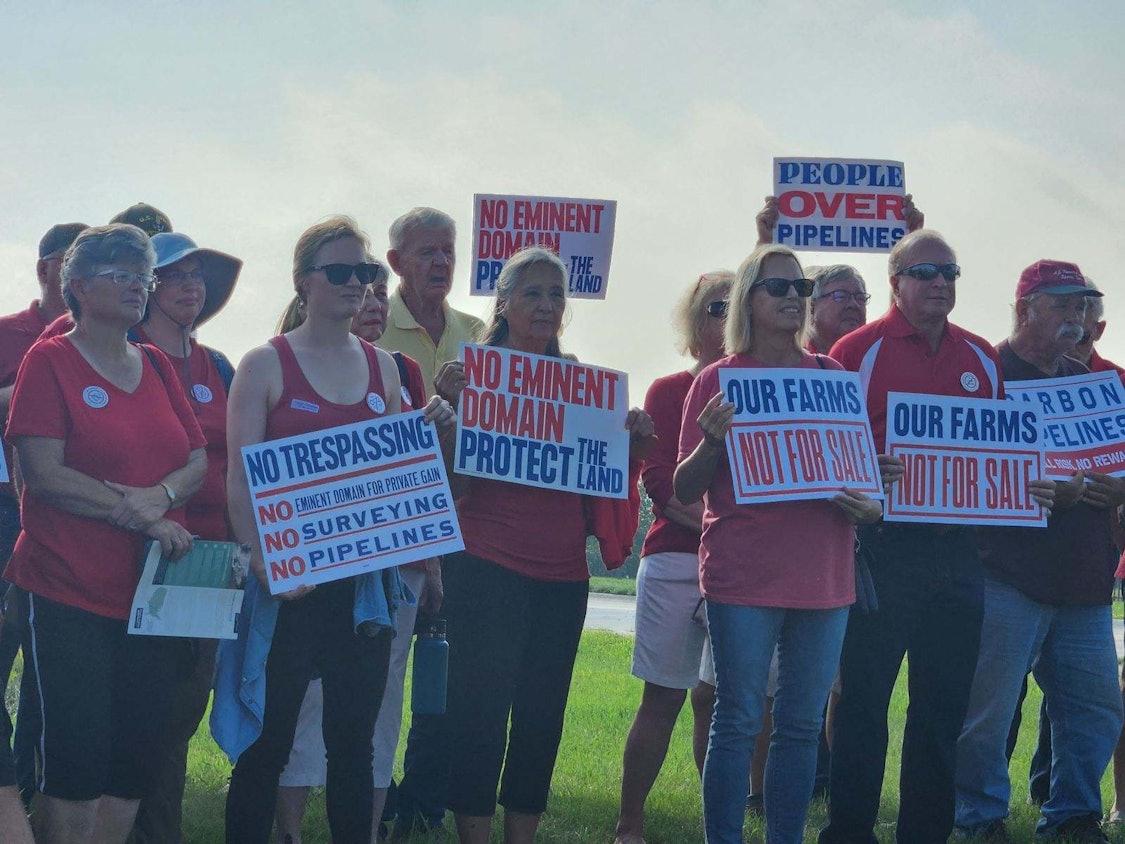
Bonnie Ewoldt is a Milford resident and Crawford County landowner.
Landowners targeted for eminent domain by Summit Carbon Solutions won several victories in recent weeks, but the fight is far from over. Though wounded, Summit continues to threaten the private property rights of thousands across Iowa, Nebraska, North Dakota, and South Dakota.
Three companies have proposed CO2 pipelines in Iowa: Summit, Navigator, and Wolf. Navigator cancelled its project last month after regulators in South Dakota and Illinois denied permits following fierce opposition from impacted landowners and concerned citizens. The Illinois Commerce Commission recommended the Wolf permit be denied, and the company has not yet obtained a permit in Iowa.
Summit also suffered significant blows from regulatory agencies in multiple states. North Dakota’s Public Service Commission (that state’s utilities regulator) denied the company’s initial permit application, and Oliver County denied its injection well permit. However, the Public Service Commission granted reconsideration, and Summit plans to reapply with a revised route farther north of Bismarck.
Meanwhile, the South Dakota Public Utilities Commission denied Summit’s permit and upheld county ordinances requiring greater setbacks than the company proposed. Summit plans to reapply and has moved senior staff into five key counties to live in cities such as Aberdeen and Sioux Falls so they can work with local residents to find acceptable alternate routes.
Because of the permit denials in the Dakotas, Summit’s grandiose plan is a pipeline to nowhere. Facing pushback from the public and rejection by state regulatory agencies, Bruce Rastetter (the CEO of Summit Carbon’s parent company, Summit Agricultural Group), recently announced that Summit’s planned CO2 pipeline project has been delayed by two years. Initially planned to be operational in 2024, the pipeline is now proposed to begin working in 2026, if approved.
Two weeks ago, the Iowa Utilities Board concluded its eight-week evidentiary hearing on Summit’s permit application. Summit executives and expert witnesses presented their case, followed by intense cross-examination from landowners’ attorneys and other parties. The board denied a motion by landowner attorney, Brian Jorde, to dismiss the case because Summit failed to meet the burden of proof.
The evidentiary hearing involved gripping testimony from hundreds of Iowans with land targeted for condemnation by eminent domain. Landowners talked about permanent land damage, decreased crop yields, disruption to farming operations, abandonment of planned building projects, and defilement of Century Farms. Many were distressed by narrow setbacks that put the hazardous pipeline dangerously close to homes and wells.
Sons and daughters of elderly landowners told heartbreaking stories of the mental distress their parents suffered from being badgered by Summit’s agents. Veterans were grief-stricken and moved to tears because the country they fought for is not protecting them from the unconstitutional taking of their land. A witness who fled communist China when the government confiscated her family’s property sees the same thing happening to her farm in America. Videos of landowner testimonies can be viewed on Bold Nebraska’s YouTube channel.
The board denied a motion to allow time for citizen comments. Neighboring landowners and tenants impacted by the pipeline, as well as concerned citizens, were not allowed to speak. The board did allow written comments and objections from those parties to become part of the official record.
Even though the hearing is finished, the Iowa Utilities Board must study thousands of pages of records, transcripts, legal briefs, and other documentation before issuing a decision. There is no deadline for the board to issue an order, and the process could take months. The board could deny the permit or approve it with conditions. Even if the permit is approved, it will be appealed and could be tied up in court for years.
Meanwhile, many other roadblocks stand in Summit’s path. Its affiliated LLCs must obtain water permits from the Iowa Department of Natural Resources for hundreds of millions of gallons of water that would be needed for carbon capture facilities. (Many of those permits could be challenged.) Summit Carbon must also obtain permits for wastewater disposal, air quality, road crossings, conditional use, and river crossings. Several counties are working on set-back ordinances, and state legislators are planning to press for eminent domain reform.
To sum up: while the Iowa Utilities Board’s hearing on Summit’s permit has ended, the fight is far from over. From the statehouse to county courthouses across Iowa, impacted landowners and concerned citizens will continue to rally against Summit’s unconstitutional land grab and its dangerous CO2 pipeline. Celebratory high-fives are premature for Summit Carbon Solutions.
Jan Norris contributed research to this essay. Top photo by Emma Schmit, published with permission: landowners rally in Fort Dodge on November 8, the second-to-last day of the Iowa Utilities Board’s evidentiary hearing on Summit Carbon Solutions’ proposed CO2 pipeline.

1 Comment
Thank you for this essay
Summit has already sunk so much money into this sorry venture, and has enough Iowa political clout, that the battle will indeed go on. I wasn’t aware that there was any high-fiving going on, but doing that would indeed be (very unfortunately) premature.
PrairieFan Mon 20 Nov 1:26 PM